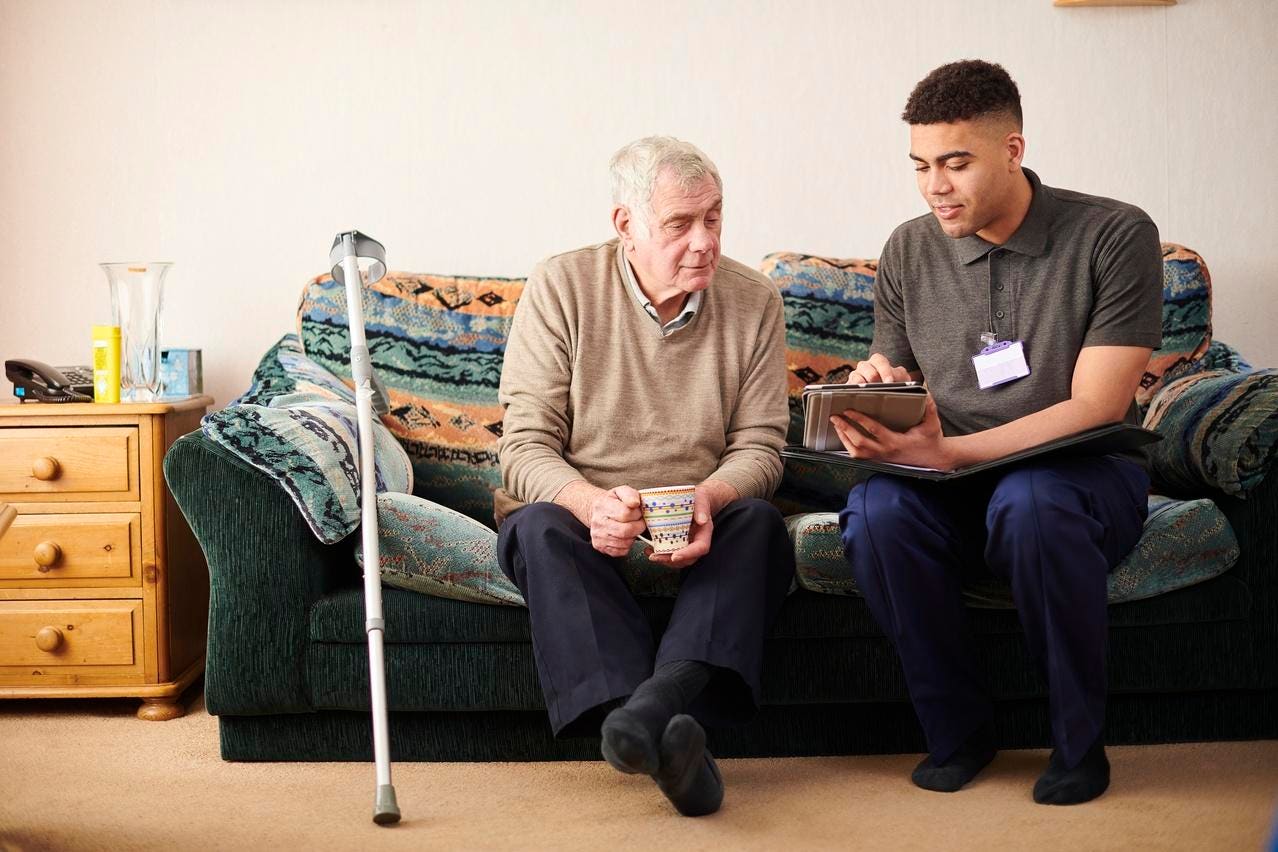The man wants to show Pat his pills.
He’s 77 years old and has trouble walking, so he asks his seven-year-old grandson to get his medicine out of a plastic tub he keeps in the bathroom. The boy returns with a pill bottle. “No, the white ones,” the man tells the boy.
“But Pappy,” the boy says. “They’re all white.”
Pat’s seen this before.
She asks the boy to bring out the whole tub. In the man’s living room, she goes through the bottles, carefully making a list of the different medications and noting which bottles are duplicates or expired. “Now that I know what you’re taking,” she tells the man, “we can get started.”
Pat Salas isn’t a pharmacist. She’s not a licensed clinician or a care navigator or a community health worker. And yet, Pat is responsible for ensuring that hundreds of people get the care they need.
Pat Salas is an insurance broker, one of thousands nationwide whose work is vital to promoting positive health outcomes. In my experience, I’ve found that brokers are often trusted members of their communities. Should we rely more heavily on them to bridge the gaps in care that plague our health system?
Searching for Better Outcomes
In 2023, beneficiaries had, on average, a choice of 43 different Medicare Advantage plans. Choosing the right one can be a challenge. New research commissioned by SCAN, the diversified healthcare organization that I lead, shows that about half of Medicare beneficiaries have spoken with a broker in order to understand their coverage options.
“My aim is to help people have a better outcome and live a better life,” says Salas, who owns South Bay Healthcare Insurance Services in Chula Vista, California. Regulations prohibit Salas and other brokers from asking direct questions about prospective clients’ health to ensure the insurers they represent can’t “cherry pick” members—which is to say, only accept those without complex conditions. Nevertheless, says Salas, when she meets prospective clients, “most people have very few problems sharing their health issues.”
Salas usually steers conversations toward client’s medications. Her first priority is to find a plan that will give them low-cost access to those drugs. Then she looks for plans that offer access to physician groups that can help the person with their condition. Last, she looks at other plan benefits, such as over-the-counter drug programs, transportation options and gym memberships. “It’s what we all should be doing,” she says.
Beyond Enrollment
Once a plan is selected and the client is enrolled, says Maggie Stedt, a broker who served as president of California Health Insurance Underwriters, brokers have a responsibility to follow up and ensure their clients are able to access care. Stedt says she regularly assists clients who need help getting in touch with their physicians or navigating hospital bureaucracies. “We’re facilitators in how to use care and where to go for it,” she says. “A good agent learns over the years what avenues to go through.”
Terry Huber, who owns Pure Benefits, an insurance agency in Albuquerque, New Mexico, opened a space in her Albuquerque storefront specifically to help clients access care and other services. Inside, employees guide clients toward local optometrists and audiologists whose services their plans cover. She has also held member meetings with pharmacists, who explain where people can find the best discounts on generic and name-brand drugs, and offers workshops about topics such as living wills and end-of-life planning. When one client asked where she could be buried inexpensively, Huber located a cemetery on the mesa where people can be interred without a casket.
“We want to be trusted advisors for people in a place where they can get good information and they can get help,” says Huber.
Sometimes client requests are much more immediate. Salas keeps three social workers on staff to meet the needs of her clients. When clients lack access to food or are being evicted, they direct them toward social service organizations that can help them.
In some cases, they do the helping themselves. They often buy groceries for food-insecure clients. Salas once bought an incontinent woman $1,000 worth of adult diapers. The woman’s health plan promised to send them, but Salas knew it would take weeks for them to arrive and, in the interim, she wasn’t willing to watch her client suffer the embarrassment of walking around with soiled clothes.
“None of this is related to their plan, necessarily,” says Salas. “It’s not part of being an agency and it’s not a requirement—it’s a basic service we provide because it’s humane.”
Formalizing the Relationship
Based on my discussions with brokers and other healthcare professionals, the work that Huber and Salas do outside of plan selection is not atypical. Nevertheless, it is outside their job description.
But should it be?
For years, healthcare experts have argued that, faced with clinician shortages and rising costs, we should extend care beyond the walls of hospitals and medical offices into the communities where our patients live. With that in mind, I’d argue that it’s time to officially evolve the role of the healthcare broker into one in which they:
- Help people navigate the healthcare system, with an emphasis on connecting them with preventative medical care
- Advocate for people when they are having trouble accessing needed services and benefits
- Promote healthy habits and behavior change that can obviate the need for expensive medical care
- Access community and other public resources that can improve health outcomes
If this sounds like the work of community health workers, it should. However, CHWs are often in short supply, and there’s no reason they should have a monopoly on providing these sorts of vital services, especially when brokers have often already earned the trust of the people they serve and have the skills to motivate behavior change.
Adapting the Current Payment Model
Some people will say that I’m both exaggerating the importance of brokers and making an argument for increasing their fee structure. Neither is the case. For one thing, I’m aware that many brokers see their work in purely transactional terms: they sign the client up for a plan, collect their commission and disappear until the following year’s enrollment period. But I also think the days are numbered for this type of agent: given the ease of comparing plans and enrolling on the internet, I believe consumers want more from brokers than just a friendly face and some efficiency with paperwork.
Second, almost all of the brokers I meet say that they’re already well compensated, and I don’t believe we need to pay brokers more to bring better health to their communities; we do need to change. (For one thing, many brokers are already doing it.) More important, the structure by which brokers are currently paid already creates the financial model through which to incentivize them to make providing community health services an integral part of their jobs. Brokers of Medicare Advantage plans are paid an “Initial Year” fee by health plans when they sign up a new member (CMS recently proposed to increase payments to $726 in most states and as high as $880 in some). Critically, they receive a substantial “Renewal Fee” when the member signs up in each subsequent year (CMS recently proposed to increase payments to $363 in most states and as high as $440 in some). Those renewal fees should be earned; and the way they should be earned is by annually providing clients with care navigation and other health services that drive positive clinical outcomes. I believe brokers who don’t offer such services should receive reduced renewal fees—or maybe not continue to serve seniors.
I will note that The Centers for Medicare and Medicaid Services (CMS) recently issued new rules regarding broker payments. Those rules have triggered numerous lawsuits. If the changes stand, individual brokers will see increased payments for new enrollments and renewals, providing added incentive for them to formally promote health in their communities. CMS can improve health and meaningfully expand the healthcare promotion workforce by aligning broker payments to health promotion work; the potential improvements in health outcomes could be transformative for the US healthcare system.
In short, it’s time to codify and standardize the work of healthcare brokers in order to ensure that the services people like Pat Salas, Terry Huber and Maggie Stedt provide are not nice-to-have benefits, but rather standard offerings one can expect from every broker. As these three women prove, healthcare brokers are trusted and knowledgeable community members—precisely what we need more of in order to improve our members’ health. It’s time to redefine our relationship with them and tap their power to bring healing to our members.
Read the full article here





